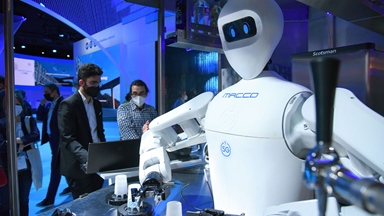Loading component...
At a glance
- Some restaurants are turning to robot waiters and other types of automation to fill gaps left by staff shortages and high turnover.
- Automation technology has advanced during the pandemic, creating concerns that businesses have greater opportunities to replace staff by automating their jobs.
- Robotic process automation may create opportunities for work through invention and supervision, while AI itself could be contributing trillions to the global economy by 2030.
By Gary Anders
The past two years have not been kind to the restaurant and catering industry. Across the board, employee turnover rates in the sector have been at unprecedented highs as workers quit due to exhaustion or to pursue opportunities in sectors they see as more stable.
Australia’s restaurant and catering sector is no different – it is short about 100,000 staff across the country.
As a result, some restaurants are turning to automations such as robot waiters.
These “waiters” bring food to tables on wheeled trollies with a set of shelves. The customer reaches out to take their food and interacts with the robot via an iPad-like screen at the top.
Robot waiters are an example of how different industries are drawing on robotic process automation (RPA) to perform tasks that were previously performed by humans.
However, this raises the question of whether they should be replacing people with robots. In the restaurant sector, there aren’t people to replace because the staff simply aren’t there, says Wes Lambert CPA, CEO of the Restaurant and Catering Association.
“A by-product of a workforce shortage is always technological advancement. And through COVID-19, it has been said that 10 years of technology and innovation were achieved in two years,” Lambert says.
CPA Australia resource
Workforce initiation
Working in a restaurant has long been a rite of passage for students wanting to fund their studies and lifestyles, and Lambert says that’s unlikely to change, although he adds that the pandemic has denied the industry of about two and a half years of young people.
“Because 93 per cent of the hospitality industry is small business, your corner coffee shops and your small restaurants and your small caterers, it’s not likely that the average server or the average host or hostess or average entry level positions are going to go away, because you still want and need that human interaction to make it a great experience,” he says.
“In some busy restaurants, you will likely find that they do automate some of their food-running tasks or automate some of their back-of-house food prep or even potentially dishwashing.”
A game changer?
Lambert argues that automation creates new jobs for the technologists, IT professionals and engineers who develop and service these robots.
In a 2021 report on automation with intelligence, Deloitte indicates the global market for automation technologies including RPA is expanding at a rate of 40.6 per cent per year.
Hyperautomation swiftly identifies, tests and automates business and IT processes using multiple technologies, tools and platforms such as artificial intelligence (AI). According to Gartner surveys conducted in 2021, more than 80 per cent of organisations “self-report increased or continued investment in hyperautomation”.
"A by-product of a workforce shortage is always technological advancement and through COVID-19, it has been said that 10 years of technology and innovation were achieved in two years."
In a report on the total economic impact of AI to 2020, PwC describes it as a “game changer”.
AI could contribute up to US$15.7 trillion (A$22.7 trillion) to the global economy in 2030, more than the current output of China and India combined. Of this, US$6.6 trillion (A$9.6 trillion) is likely to come from increased productivity and US$9.1 trillion (A$13.1 trillion) is likely to come from consumption side effects.
Yet there is still a fear that automation will cost people their jobs.
One in 10 Australian jobs are at high risk of being automated, according to a report by the Organisation for Economic Co-operation and Development (OECD) last year. Additionally, the report states, another quarter are likely to face significant change.
On the whole, automation is more likely to change tasks within jobs rather than replace entire jobs, requiring workers to develop new skills. In the future of work, digital skills will be more important than ever.
Australian outlook
Automation and technology are positive influences on the accounting profession. By freeing up accountants from performing manual tasks, automation is helping to accelerate the transformation of accountants from number crunchers to providers of strategic business insights.
Anju De Alwis FCPA, a member of CPA Australia’s Ethics and Professional Standards Centre Of Excellence and the founder of accounting education provider Ultimate Access, says it’s up to individuals to respond to the change.
“Whatever the job that you’re doing, I think it’s important for the individual to take responsibility for their outlook as well as their jobs and think about the other ways that they can add value,” she says.
Automation usually starts with the simple tasks – those repetitive, rule-based tasks that are easy to transform into an algorithm, and these are often the entry-level jobs into a profession for recent graduates.
Will the rise of robots deny these potential workers a start?
De Alwis says many of these lower-level tasks will still need to be performed, but they will be done differently. Junior workers will still need to learn and understand the basics of their industry.
Take auditing, for instance. “Double entry does not change. The ethics do not change. Auditing does not change. Internal controls do not change,” she says.
The jobs themselves could change.
“Let’s say you are a school leaver. You understand RPA, robotic process automation. There is absolutely no doubt in my mind that you’ll be just going into another company and going into that job at the entry level, and they’ll be more than happy to embrace you,” de Alwis says.

